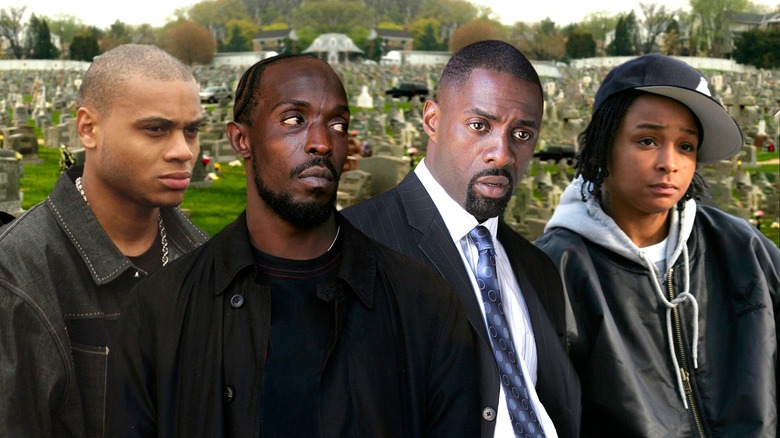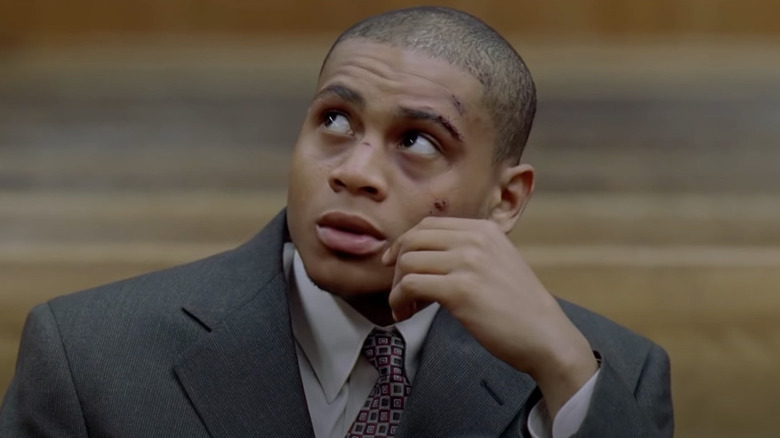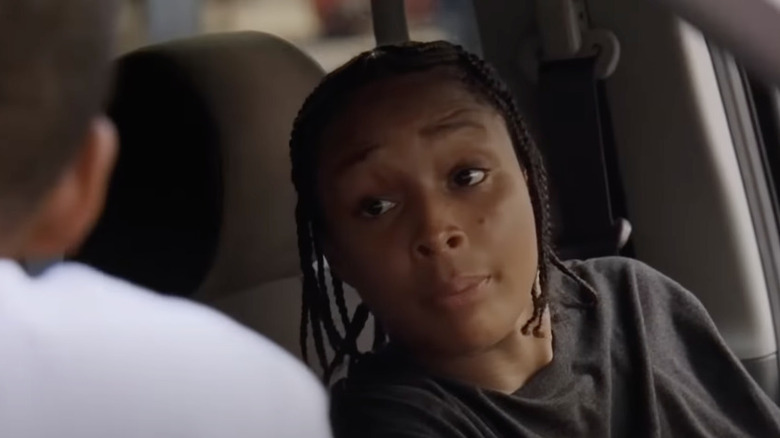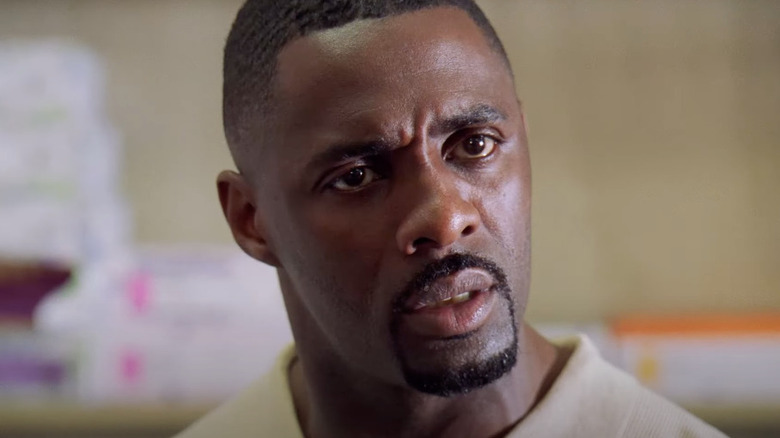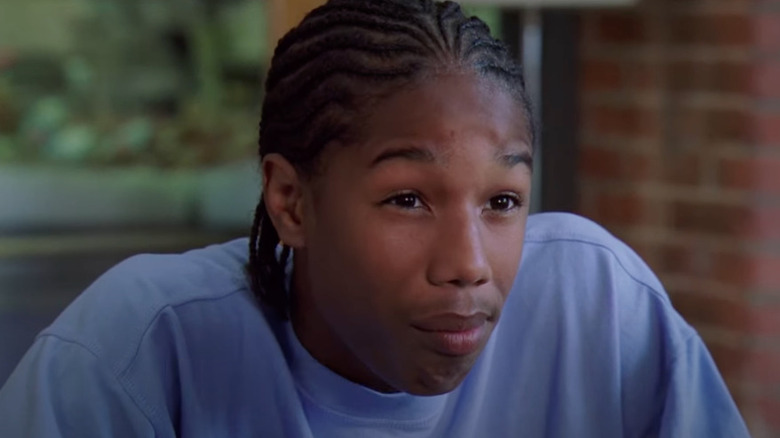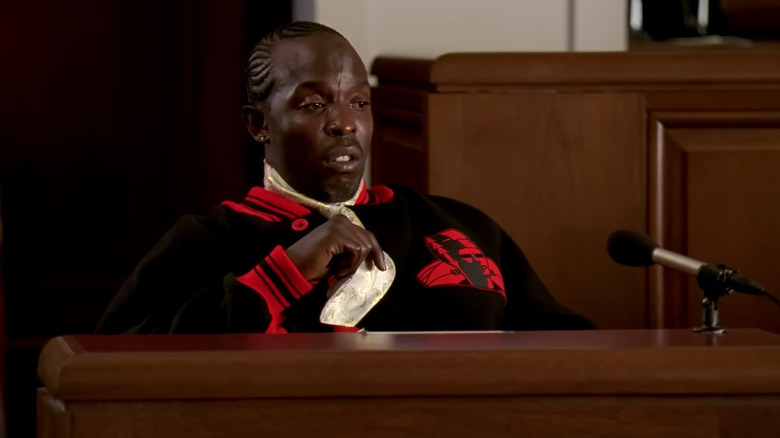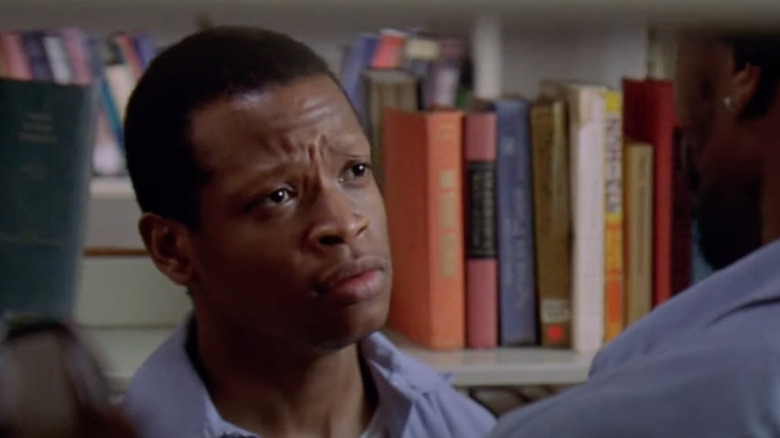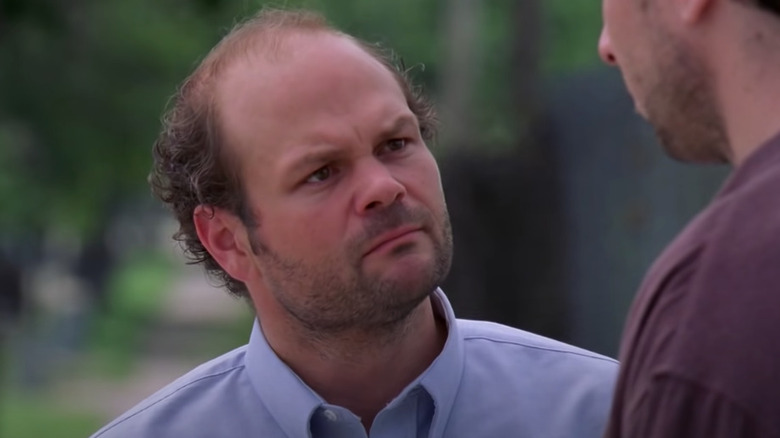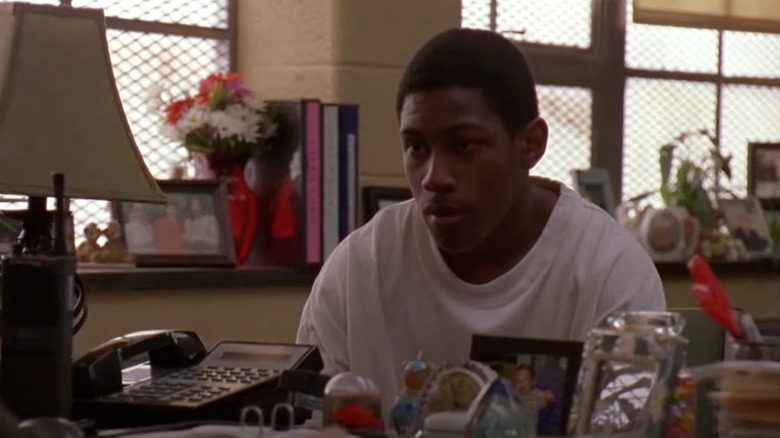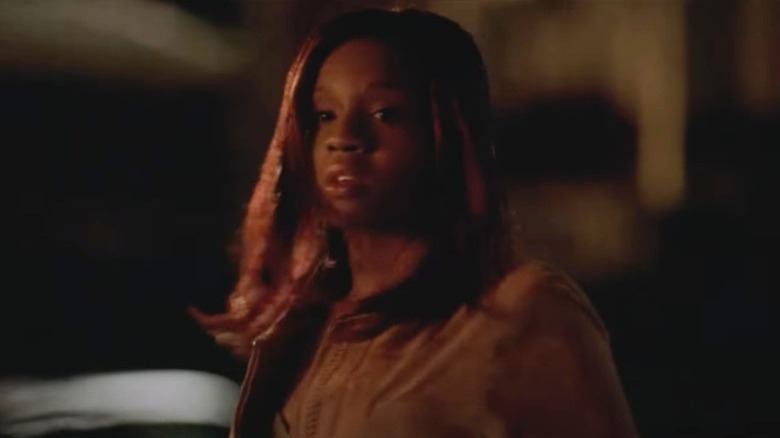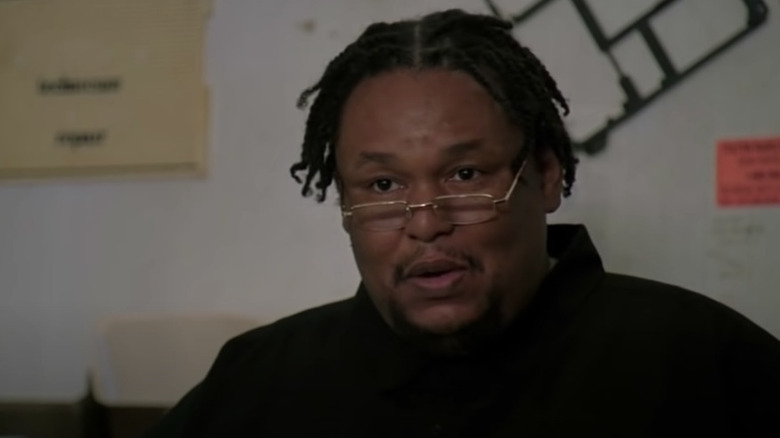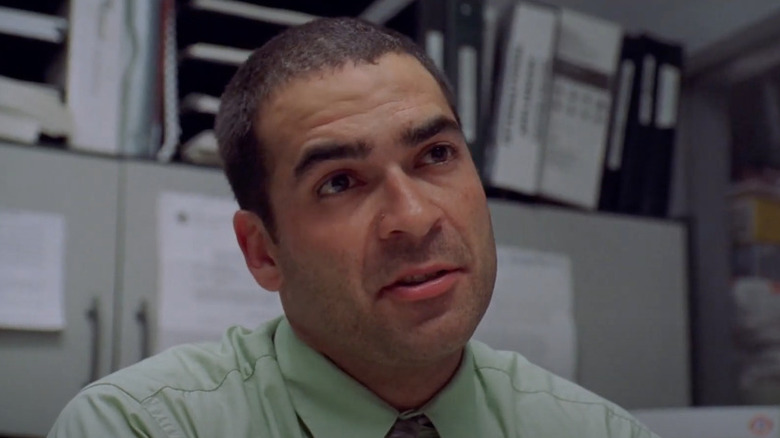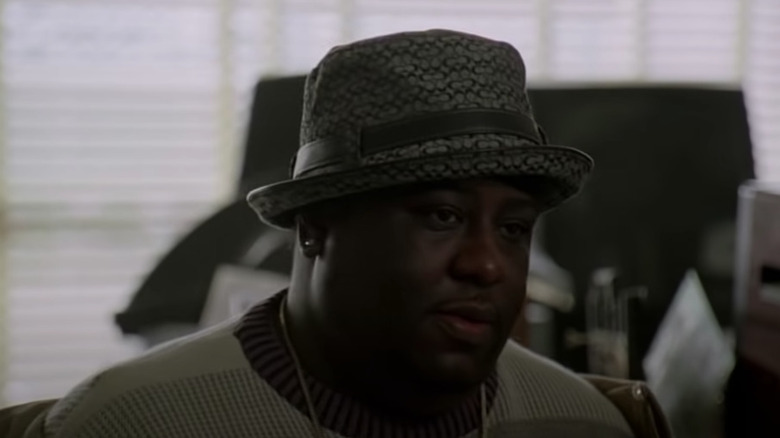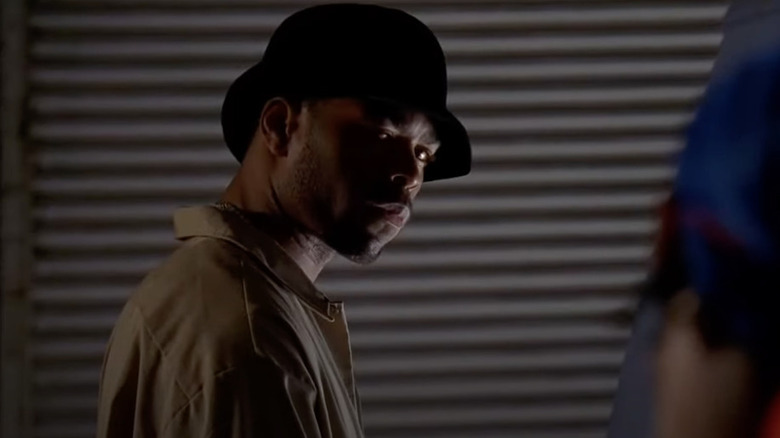The Most Devastating Deaths On The Wire
When it comes to drug dealing, stolen goods smuggling, and outright murder, no TV show has ever gone harder than "The Wire." Following Detective James McNulty and his team of officers, East Baltimore's crime ring is explored through rival kingpins of the drugs game. With a stellar cast including Dominic West, Idris Elba, and Michael B. Jordan, "The Wire" went on to compete with some of the biggest programs in the early 2000s.
Though fan-favorite characters such as Bodie, Wallace, and Cheese regularly face off against law enforcement, it could be argued that the biggest threat to their livelihoods is each other. Constantly questioning the loyalty of those around them and secretly betraying those that they are close to, the Stanfield and Barksdale organizations were behind some of the show's most devastating deaths.
After celebrating its 20th anniversary in 2022, "The Wire" is being re-appreciated as one of the best TV shows of all time. Whether it's through reignited social media conversations or dedicated podcasts, the deaths that made "The Wire" so explosive and emotional are back at the forefront of our minds. If you're gearing up to binge the show all over again or just want to have a good cry, we're looking back at the most devastating deaths across all five seasons of the program.
Bodie
As one of the OG characters in "The Wire," Preston "Bodie" Broadus (J.D. Williams) quickly became a fan favorite for his unflappable character and loyal personality. Working as a drug dealer for the Stanfield and Barksdale organizations, he's no stranger to physical confrontation, beating addicts, and facing off with the cops from the moment viewers are introduced to him in Season 1. Beginning his journey as a 16-year-old crew member, Bodie racked up 37 appearances until his untimely death in Season 4, which is something that still pulls at audience heartstrings over 20 years later.
Once Bodie shares that he's willing to inform on Marlo (Jamie Hector) after questioning his loyalty, a target is on his back, leading Chris (Gbenga Akinnagbe) and Snoop (Felicia Pearson) to launch an ambush. Choosing to stay and fight rather than escape, Bodie gets involved in a shootout that nearly kills them all — but only ends up getting him. As a new member of Marlo's gang shoots Bodie in the back of the head twice, viewers were left reeling after the cold-blooded hit that they weren't expecting. Knowing he was willing to die where he stood, the sudden cruelty of Bodie's exit is regarded as one of the most tragic TV deaths by hardcore fans.
Snoop
As one of the main antagonists from Season 3 of "The Wire" until her death in Season 5, Felicia "Snoop" Pearson put the cat among the pigeons by being one of the only women in the game. Committing three murders in various gang wars while being easily connected to plenty of others, her natural mix of being alluring as well as terrifying makes her character one of the most intriguing journeys to follow. Acting as one of Marlo's main enforcers, it's safe to say that she made enemies pretty quickly — meaning those that held a grudge against her are keen to seek her revenge.
As of Season 5, the quest to take Snoop down wins out, with Michael (Tristan Wilds) killing her after a hit was put out on him. Just like Bodie, Snoop is calm in accepting her fate, with her casual conversation seconds before she dies making the scene hard to watch, regardless of her popularity. Even though her death is the result of "kill or be killed" gang thinking, Snoop's exit goes to show that even the hardest of criminals can have the softest of touches.
Stringer Bell
Nowadays he's better known for his roles in "Luther," "Beast," and "The Harder They Fall," but before Idris Elba was A-list royalty, he was playing Russell "Stringer" Bell in "The Wire." Appearing on the show from the first to the third season, Stringer was second in command to big-time drug dealer Avon Barksdale (Wood Harris), later using his instinctive business acumen to invest in real estate and develop political contacts. Fans have given his character kudos for being the toughest yet most respectable figure of the lot, priming him up to become a classic tragic archetype in life and in death.
Sadly for Stringer, he died exactly how he lived — with nothing and nobody by his side. After Avon and Stringer have both unknowingly betrayed the other in Season 3, Omar Little (Michael K. Williams) and Brother Mouzone (Michael Potts) track him down to offer him money. With Stringer realizing that he can't get them to change their minds, Omar eventually opens fire, fatally wounding Stringer in the process. It's the narrative lynchpin for the Barksdale gang dismantling, completely changing the direction "The Wire" takes from that moment on. Fans recognize that there is a sadness in Stringer becoming too big for his boots, with his ongoing failures perhaps veering his death toward being devastatingly pathetic rather than heroic.
Wallace
Another star on the rise before he hit the big time, Michael B. Jordan made a name for himself playing the fresh-faced Wallace in "The Wire." Working as one of the youngest drug dealers in the Barksdale organization, Wallace is only 15 when fans see him getting mixed up in D'Angelo's (Lawrence Gilliard Jr.) crimes and killer scrapes. Though he proves himself to be incredibly intelligent, Wallace's naivety often works against him, putting him in a perilous situation as the first season progresses. After being picked up by police, Stringer assigns Bodie to kill Wallace after becoming suspicious of his waning loyalty. Bodie and Poot (Tray Chaney) spend the day with him, before gunning Wallace down as he begs for mercy.
Being the kids that the elders were supposed to take under their wing, it's heartbreaking to watch Wallace meet such an untimely end and it's considered one of the saddest TV character deaths of all time. Fans felt sorry for him, and Bodie's instant reaction of twisting the blame onto Wallace only pushes the metaphorical knife in further. Not only is the way Wallace is killed absolutely hideous, but the ordeal is terrible enough to cause D'Angelo to question what he is doing. There's a permanent wedge between him and Stringer, but the distance between "The Wire" and its fans might be even bigger — with Wallace's death cited as one of the most brutal in the show's history.
Omar Little
Out of the infamous key characters that shape "The Wire" and its legacy, Omar Little is one of the most notorious. As the stickup man who robbed both the Barksdale and Stanfield organizations, Omar's colorful character makes him an unmissable match. Even though he seems approachable with his refusal to swear and openly gay inclusivity, his kill count is also one of the most brutal across "The Wire" characters. This makes him a target from the outset, though his luck manages to last until Season 5. In the grand scheme of the show's deaths, Omar's is fairly unassuming, being shot by one of Michael's crew after being followed into a convenience store.
It's this sense of a quiet goodbye that makes Omar's death a different kind of devastating. Not only has he taken out some of the show's biggest names, the fact that no one else seemed to care is something that has stuck in fans' minds. However, some viewers say this only adds to Omar's growing legacy, making him a name on the streets can nobody can truly pinpoint. With cracking cinematography and a little kid doing the dirty work, Omar's death is all kinds of intriguing and undeniably devastating in its own unique way.
D'Angelo
Even when characters in "The Wire" are complicit in other devastating deaths, it doesn't make their own any less poignant. This is true for D'Angelo Barksdale, the notorious head of the Barksdale organization. Appearing in the show's first and second seasons, his beginnings in the show started as frantically as they finished, appearing in court after being charged with first and second-degree murder. This leads to D'Angelo's tragic downfall in Season 2, becoming involved with the heroin supply infiltrating the prison he is incarcerated. Afraid that he will snitch on what the organization is doing, Stringer arranges for his cousin to finish D'Angelo off on the inside.
It's devastating to know that in a different set of circumstances, D'Angelo could have been able to turn his life around. With a child and girlfriend on the outside, there's arguably more at stake when it comes to losing him, with fans of the show agreeing that his death is particularly soul-crushing. At the same time, those around D'Angelo are double-crossing him, with his mother taking him for granted and his girlfriend cheating on him with Stringer in the opening episode of Season 2. It feels as though D'Angelo was stuck in a no-win situation, and realizing the fact that death could have been seen as his solace is even more distressing. Mugs must have thought so too, staging D'Angelo's death so it looked like a suicide.
Frank Sobotka
It's rare that we see characters on a more socially respectable path in "The Wire," but even secretary-treasurer Frank Sobotka (Chris Bauer) doesn't have completely clean hands. Introduced to fans in Season 2, Frank worked alongside a man with the alias known as The Greek, who was in charge of an international smuggling organization. Only swayed to join as a means to fund his political campaigning, Frank quickly gets in over his head and puts his young family at risk. When The Greeks call out Frank's loyalty, an inside FBI agent lets slip about Frank's informant status, causing him to be murdered.
While fans don't get the blow-by-blow account seen in other devastating deaths, Frank's murder opens up bigger questions about family loyalty. Fans have argued that what makes his death so poignant is the level of manipulation suffered by Frank's nephew Nick (Pablo Schreiber) at the hands of The Greek, with Nick's well-being on the line when he takes on the risk of Frank's system to get more money. Not only that, but some viewers say Frank's character is actually the most tragic of them all, with his death highlighting what happens when a good person ends up on the wrong side of the tracks.
Sherrod
Death hits differently when kids are involved, and homeless youngster Sherrod (Rashad Orange) is one of the many casualties that come out of the show's fourth season. After briefly being introduced to his circumstances in Season 3, Bubbles (Andre Royo) takes Sherrod under his wing, initially insisting that he needs to go back to school. His mentorship quickly dissolves into drug dealing, trading faking homework for being involved in assaults on Namond Brice (Julito McCullum). With Sherrod later owing money, Bubble prepares a lethal "hot shot" to get the same addict off of his back — only for Sherrod to take it himself.
Aside from his young age, Sherrod's death is a hard-hitting one for a variety of different reasons. There's a "Romeo and Juliet" feel to how he chooses to go, with Bubbles later waking up and realizing what has happened. At the same time, Sherrod's decision to take the shot shows a lack of self-worth as well as an overwhelming panic in the face of settling the debt. If Sherrod had clearer guidance from the beginning, there's a good chance that he could have stayed in school and changed his life for the better.
Devonne
In Season 3 of "The Wire," violence against women got particularly ugly. Getting mixed up in the Barksdale and Stanfield drama, Devonne (Tiara Harris) is a woman frequenting the wrong strip clubs at the wrong time. At the request of Avon, she has sex with Marlo, which leads to a set-up meeting the next day. Seeing the encounter as a trap, Marlo confronts Devonne outside her house before shooting and killing her. Chris is there to witness the killing, citing it as a "necessary murder."
Even casual fans of the show can see that Chris is completely wrong in his judgment, with Devonne posting no actual threat to either side. Though some fans agree that Devonne was secretly working for Avon, it's more than likely that she was brought into the fold against her will just for being a seductive distraction. Though her time on screen is limited, Devonne's death sends the message that women are still viewed as weak pawns, as well as a disposable byproduct of the bigger criminal picture.
Prop Joe
Racking up 24 episode appearances over five seasons, Joseph Stewart (Robert F. Chew) — also known as Prop Joe — is best known for being the narcotics trafficking lynchpin in East Baltimore. Preferring to err on the side of caution and seek non-violent resolutions to his problems, it's both surprising yet inevitable that Prop Joe meets a devastating end. By the end of Season 4, Joe has been caught up in various betrayals, resulting in him being one of many looking for revenge against Omar. His time in Season 5 is cut short, recruiting Marlo to join New Day before being shot in the back by Chris.
Though Omar clearly had him on his radar as a target, Prop Joe's death isn't necessarily justified. Viewers realize that Joe was essentially a ladder for connections, and by killing him, Chris is able to gain more for himself. Getting rid of the middleman isn't exactly the most explosive reason to bump someone off, but not acknowledging what Prop Joe had to give is devastating in itself.
Glekas
Any good international smuggling organization needs a frontman to pick up the slack — and for the Greeks, the fence is George Glekas (Teddy Cañez). Keeping an eye on things through the front business pyramid scheme, his appearance in Season 2 is as brief as it is devastating. Before his stint on "The Wire," fans find out Glekas had been charged with fencing stolen goods in San Diego and remained indicted despite a lack of evidence. Before he could be arrested, Glekas is shot and killed by Chester "Ziggy" Sobotka (James Ransone), thanks to a dispute over a stolen car smuggling deal.
Glekas' sudden death is certainly a shock to watch — but the devastating consequences affect more than just him. Ziggy takes the wrap for killing him, with the time he was serving most likely contributing to the problems he was having with his own family. The outcome for both Glekas and Ziggy highlights just how unnecessarily ruthless the Greeks can be, with Ziggy in particular highlighted as a victim of his circumstances.
Old Face Andre
For a character that only appeared in six episodes in Season 4, Old Face Andre (Alfonso Christian Lover) certainly made his mark. Owning a local convenience store that doubled as a stash house for Marlo, Andre immediately gets into debt when the stash is robbed by Omar. To get revenge, Chris murders a delivery woman and calls on Andre to inform the police that Omar did it. Under subpoena, Andre is brought in to corroborate the story in court, leading to him giving Joe money and pleading for his life. The pleas fall on deaf ears, with Chris leaving his body in a vacant building.
From the moment Andre stepped into "The Wire," fans of the show commented that he was disrespected. As well as becoming yet another unnecessary death, Andre is caught between a rock and a hard place from the word go, getting into one life-threatening scrape after another that is way out of his control. Some level of respect arguably should have been given to him because he never ratted out the truth, with the decision to discard Andre perhaps taking the easy way out. Killing anybody who could be remotely suspicious is not a game plan that will win many allies, with devasting deaths like Andre's made only more inevitable.
Cheese's dog
Though Cheese (Method Man) ultimately meets his make for his role in Prop Joe's death, it's the passing of Cheese's dog that got fans tearing up in a different way. Known for being one of the toughest characters in "The Wire," Cheese's kill list speaks for itself. Taking out two of the biggest characters in the show's history, he's known for being cold-hearted and ruthless when it comes to getting the job done. Because of his criminal links and nefarious attitude, it's hardly a surprise to learn that Cheese has become involved in the dogfighting scene. After his prize dog loses a fight, Cheese shoots it out of blinding rage.
Not only do those around him think that Cheese has gone too far, but it's a devastating turning point for Cheese himself. Out of every assault and murder that he has been involved in, the shooting of his dog is the only death to provoke any emotion in him. Watching Cheese break down for the first time is tough to watch, finally learning some sense of remorse over a situation that easily could have been avoided. On top of that, the use and eventual death of the dog are incredibly cruel and degrading.
